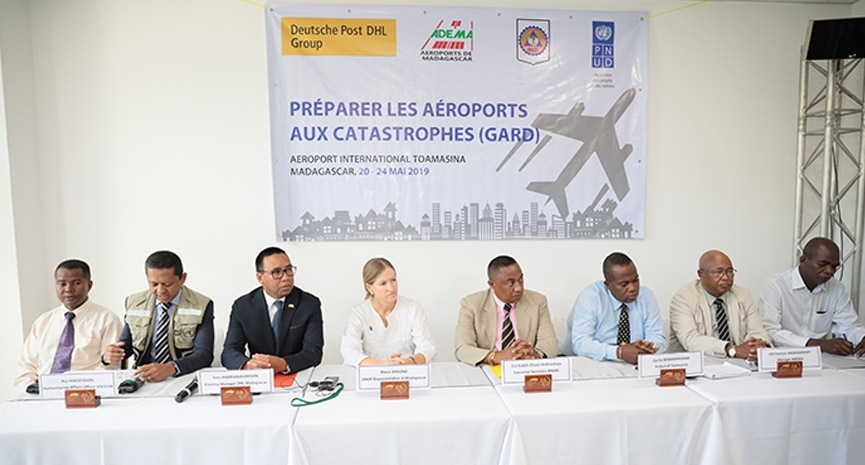DPDHL Group, UNDP, OCHA conduct airport disaster management programme at Madagascar
Deutsche Post DHL Group (DPDHL Group), the United Nations Development Programme (UNDP) country office and the United Nations Office for the Coordination of Humanitarian Affairs (OCHA) is conducting a four-day disaster preparedness workshop called Get Airports Ready for Disaster (GARD) from May 20 -24, 2019. They have t

May 22, 2019: Deutsche Post DHL Group (DPDHL Group), the United Nations Development Programme (UNDP) country office and the United Nations Office for the Coordination of Humanitarian Affairs (OCHA) is conducting a four-day disaster preparedness workshop called Get Airports Ready for Disaster (GARD) from May 20 -24, 2019. They have teamed up with National Bureau for Risk and Disaster Management (BNGRC - Bureau National de Gestion des Risques et des Catastrophes) and Toamasina International Airport (Aéroport de Madagascar – ADEMA). Held at the Toamasina International Airport in Madagascar, the programme developed by (DPDHL Group), UNDP and OCHA, with the support of World Food Programme (WFP), aims to better prepare airports to handle the sudden surge of incoming relief goods, if a major natural disaster strike.
“Preparedness measures to respond to disasters must improve airports readiness to manage emergency humanitarian assistance, even in the worst chaotic scenarios. Only in this way humanitarian workers could properly do their work, and the country will be able to save as many lives as possible and allow aviation to meet humanity’s and sustainable development goals,” noted Marie Dimond, UNDP resident representative for Madagascar.
Chris Weeks, director of humanitarian affairs at DPDHL Group, said, “Using our logistics expertise and the partnership with UNDP, we have in collaboration run GARD workshops in nearly 50 airports across 25 countries and trained more than 1,200 people at airports around the world. The GARD workshop allows us to work with authorities to increase the surge capacity of airports after natural disasters. It also helps to improve the overall coordination across various organisations involved in relief efforts when a disaster hits.”
Yves Andrianaharison, country manager, DHL Madagascar, said, “During natural calamities, the airport becomes the centre for international support after a natural disaster has hit. The GARD programme is coordinated jointly with the national stakeholders – from airport authorities to emergency services such as the special mobile force, police helicopter squadron as well as the security manager. It is therefore vital to prepare all relevant stakeholders to be able to work hand in hand in this situation and to develop a contingency planning that will respond well to an emergency and its potential humanitarian impact.”
Madagascar is prone to natural disasters and in particular to cyclones. As such, it is imperative the plans be developed to support the airport to be able to support natural disaster management response. The workshop will bring together representatives of all aspects of airport operations, the National Bureau for Risk and Disaster Management (BNGRC), United Nations agencies as well as representatives of national civil aviation authorities.
“The lessons learned from the experiences of Madagascar in the emergency management of the immediate aftermath of the disaster caused by tropical cyclone ENAWO (2017), have highlighted the necessity of improving the capacity international airports of the country. The main expected outcome from this GARD workshop is to be detailed in a disaster preparedness and response plan along with relevant protocols and procedures for these international airports of Madagascar in order to support them become the vital hubs for the entry and exit points through which all relief efforts are undertaken. At the same time staff from BNGRC and the authorities at international airport are trained in the necessary protocols and know-how to swiftly respond and face efficiently in case of dramatic situation and potential emergencies,” explained Colonel ELACK Olivier Andriankaja, the executive secretary of BNGRC.


